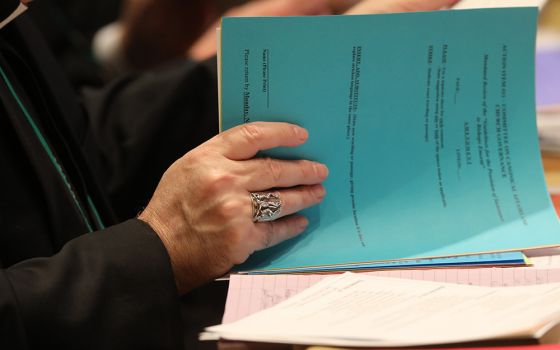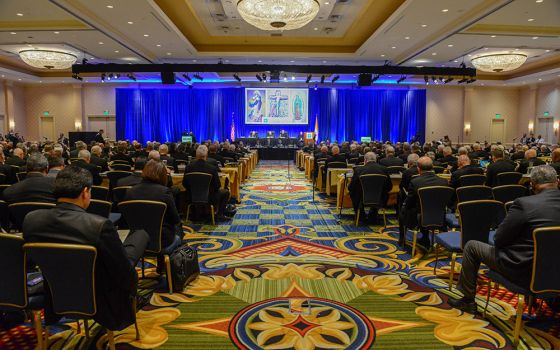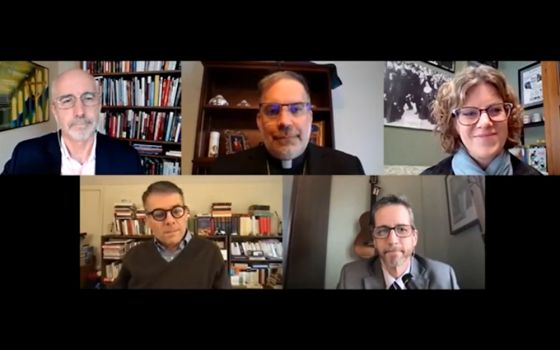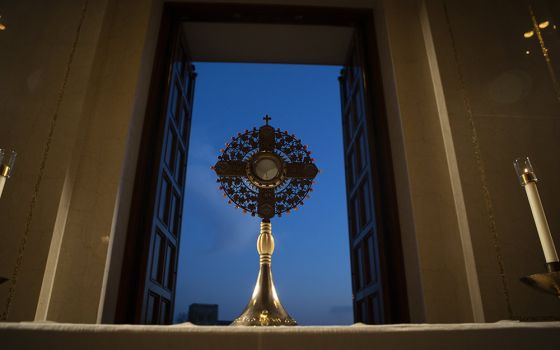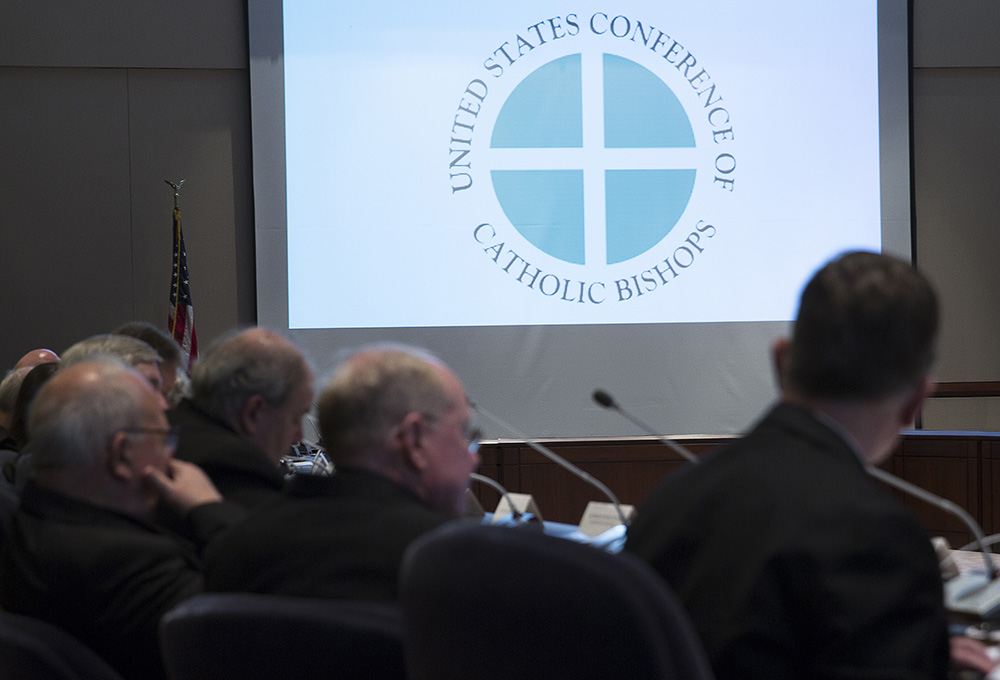
Bishops meet at the headquarters of the U.S. Conference of Catholic Bishops in Washington, D.C., in January 2018. (CNS/Tyler Orsburn)
The recent vote by this country's Catholic bishops, the equivalent of a corporate tantrum, was cringe-inducing but should not have been a surprise. The move to produce a document designed to render a severe and public judgment of President Joe Biden was engineered by men who, ensconced in a culture capable of stunning depravity and cover-up, have been searching for any means to reestablish their authority.
The vote by three-quarters of the bishops was the latest in a series of tawdry displays of desperation cloaked in the language of piety and gestures of moral superiority. The irony is as subtle as a Wile E. Coyote anvil. Their cause even further off target. The subsequent protestations — that any new document will not be a political statement — is a transparent reaction to public outcry. The damage has been done.
Equally transparent for those who have been observing the conference over the arc of several decades is that this latest commotion is far more about the bishops themselves than anything having to do with Biden or a need to protect the sacramental life of the church.
It would be a mistake to think that Biden has presented some enormous, formerly unanticipated crisis that now requires the bishops' energy and brilliance to construct a teaching statement. It is a mistake to think that without him in the picture they would be creatively and collaboratively engaging major issues and writing persuasive position papers.
Forget it. They have shown themselves minimalists in facing other moral issues, including an obscenely immoral military buildup; new generations of nuclear weapons that make a mockery of their previous pastoral statement on the issue and threaten life as we know it; vast inequities in the richest democracy in the world; ongoing consequences of systemic racism; a climate crisis that threatens Earth itself. The U.S. Conference of Catholic Bishops has become a shell of its former self. As colleague Michael Sean Winters has written, we're now witnessing the "collapse of the U.S. bishops conference."
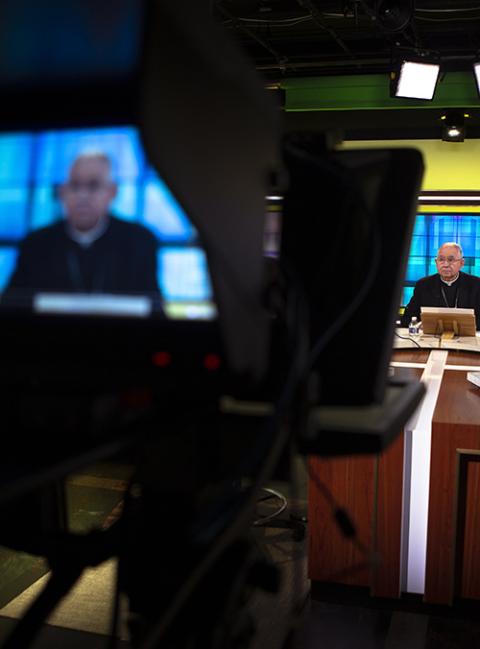
Los Angeles Archbishop José Gomez, president of the U.S. Conference of Catholic Bishops, is seen at conference headquarters in Washington June 16, 2021. (CNS/Tyler Orsburn)
NCR has observed — and meticulously documented — the downward spiral of this episcopal conference for decades. The diminishment has been largely self-inflicted. It is tough to be a moral arbiter when representing an institution so deeply compromised and damaged by the glaringly immoral behavior of its leadership. In the search for legitimacy, the bishops found refuge in a small partisan corner of the public square, purchased at a high cost — their allegiance in exchange for political promises on a single issue.
In the nearly half century since the 1973 Roe v. Wade Supreme Court decision legalizing abortion, the bishops have used a single political approach — overturning that decision — as the sole measure of Catholic fidelity.
The approach reduces Catholic political activity to a zero-sum game in which the only winners will be the extremes — pro-choice and pro-life (each term wholly deceptive and inadequate). The advocates on the fringes — from groups such as NARAL and Catholics for Choice on one side, to the American Life League and the National Right to Life Committee on the other, to name just a few along the crowded spectrum — will continue to collect tens of millions of dollars to prolong the insoluble debate. In nearly 50 years, the bishops have persuaded few who were not already convinced of their view.
The collapse of the U.S. bishops' conference might be consequence enough if it were an isolated event. But as theologian Massimo Faggioli notes in his latest book, Joe Biden and Catholicism in the United States, "The church in the United States is not just any church. It occupies a unique place within the global ecclesial communion." In short, what happens to the conference here will have global consequences.
This recent tantrum, ostensibly about Biden, was really more about the bishops and their uncertainty than any political or moral issue. Politics merely provided them the path to a self-destructive act.
The late Eugene Kennedy, psychologist, former Maryknoll priest and one of the most astute church observers of the late 20th and early 21st centuries, understood long ago that the U.S. bishops were harboring what Kennedy described as a deep moral wound.
It is a wound, he wrote in NCR, "that they can neither diagnose nor recognize as a symptom of a more basic, if long developing, sacramental crisis of whose contemporary form they are the authors."
Advertisement
Of the abuse crisis, he wrote at the time: "The foundational crisis is the impairment, or complete loss by church leaders, of the sacramental sense, that feeling for the theological principle of sacramentality, the notion that all reality, both animate and inanimate, is potentially or in fact the bearer of God's presence."
In 2002, he was one of the earliest to speak of the hierarchy as a deeply flawed culture in a piece headlined "Abuse scandals strained an already crumbling institution." Kennedy, who while still a priest helped produced a study of priesthood that correctly assessed the psychological minefield predictive of the abuse scandal, knew the terrain. He knew that the scandal was symptom, that the rot went to the foundation. The bishops ignored the 1972 study and his later writing.
Jesuit Fr. James Keenan, the renowned theologian at Boston College, added a later insight when he recognized that hierarchicalism is a culture unto itself and one he describes as "brutal" and as "the exclusive power culture of the episcopacy." It is a culture to which men are seduced with "allurements" of privilege and power.
The antidote, he believes, is a new emphasis on vulnerability, not as weakness, but as a strength, a quality "allowing oneself to be at risk in response to others."
The U.S. bishops' conference has become a dysfunctional and leaderless organization. That would be the case even if the vote on the intent to construct some manner of document had gone the other way. The problem didn't begin with Biden. Nor is it going to end with whatever happens at their November meeting. Whatever words they come up with will not address the deeper wound, the loss of moral authority they brought upon themselves, or the lack of vulnerability that would allow them to understand what true spiritual leadership means.
Largely disregarded in the wider community, the only recourse left the bishops was to publicly humiliate one of their own, the most observant Catholic president in the country's history.
The conference is a shambles, with some of its members thrashing about, insisting that they are the authorities who must be obeyed. Few comply. Largely disregarded in the wider community, the only recourse left the bishops was to publicly humiliate one of their own, the most observant Catholic president in the country's history.
They may yearn for the days when they weren't owned by political actors, when they could regularly command center stage in the public square and pronounce with authentic authority on major issues of the day. Regaining that level of trust, however, will take a long time. It won't happen with an ideologically driven attack on a fellow Catholic.
Pope Francis has changed the image for the community from an encampment behind well-defined barriers, with border-control bishops checking credentials of those coming and going, to a community of journey and accompaniment. In that new image, boundaries become blurred and the travelers' first instinct is welcome, not checking if spiritual visas are in proper order.
It is a vision that understands the limits of religion in the public square and the limits of politics as moral agent. The bishops, having lost their own moral authority, tangle up the difference between the two spheres and end up, inevitably, as pawns in others' political schemes.
If hope for Catholics in the pews is to be more than a gossamer wish, it lies in that vision of Francis and in those bishops who, in unprecedentedly public ways, have disagreed with the conference's hasty move, one made in defiance of Vatican wishes. Having now an open choice, ordinary Catholics can opt for the wisdom and prudence of that minority, which will only grow through the rest of Francis' papacy.
The creation of a special committee, later disbanded, to deal with the Biden problem, followed by the vote to write a document clearly aimed at Biden but later revised on the run in the face of public outcry — all of that is part of the conference's long, sad saga. The progression of the plot has been understood for decades by those who had a clear-eyed and critical understanding of hierarchical culture.
What we're witnessing may be what Fr. Richard Rohr calls the disorder that has to precede a new order. This may be, in classic spirituality terms, the darkness one must live through in order to come to new wisdom.
Somewhere on the other side of this foolishness, presuming abundant grace at work, the rest of the church, the people and priests and others who have chosen to endure and stick around, might yet be waiting to continue the journey.





